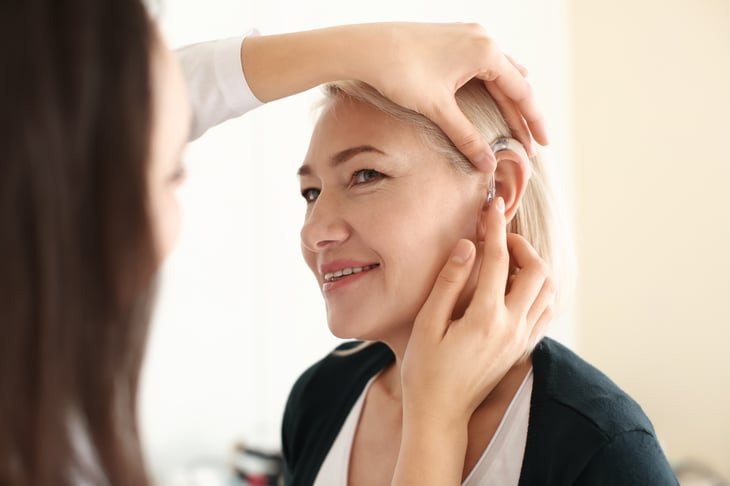
Hearing aids are a great tool for improving quality of life, but only 1 in 10 people who need a hearing aid ever use one.
There are misconceptions about these medical devices (we’ll get into that later), so it’s important to understand the reality of their benefits.
First we’ll look at the medical benefits of hearing aids, then the technological advantages.
1. Longer life

Research from Keck Medicine of the University of Southern California found that participants with hearing loss who regularly used hearing aids had a 24% lower risk of mortality than those who didn’t.
They defined those with regular use as adults who use hearing aids at least once a week, five hours a week or half the time.
Researchers from this study aren’t entirely sure how hearing aid use improves mortality, but one theory is that the device’s improvement on one’s mental health leads to better overall health.
2. Lower fall risk

Hearing loss increases your risk of falling, and falling is one of the top causes of death from injury for those age 65 and older.
A study published in the Journal of the American Geriatrics Society demonstrates that hearing aids can reduce that risk. Researchers found that adults with hearing loss who wore hearing aids had a 50% lower risk of falling, compared with non-users. Those who wore hearing aids at least four hours a day reduced their risk by 65%.
3. Lower dementia risk

Researchers from the University of Michigan concluded that subjects who used hearing aids had an 18% lower chance of developing dementia within three years of their hearing loss diagnosis than those without hearing aids.
A separate study, presented at the 2023 Alzheimer’s Association International Conference, found that older adults with hearing loss were 19% less likely to go through cognitive decline than their counterparts.
4. Lower depression risk

Study participants with hearing aids had an 11% lower risk of developing depression or anxiety within three years of their hearing loss diagnosis, according to University of Michigan researchers.
It’s hard for some people with hearing loss to interact with others because of the exhausting amount of effort it can take. This extra energy pushes some to retreat socially, avoiding friends and family, leading to isolation and loneliness.
Some studies have shown that depression symptoms can be reduced in just three months after starting to use hearing aids.
Technological benefits

There’s more than just one type of hearing aid, and each option provides its own unique benefits.
1. Tracking health data

We’ve already seen how hearing aids can help someone’s mental health, but now modern technology takes things a step further.
Some hearing aids have biometric sensors that can count steps and track other physical activity. Certain models can also monitor heart rate or your level of social interaction, which can be helpful for those who are being conscientious about isolation.
2. Listening to a TV, radio or computer directly

Those with hearing loss can find aids with wireless connectivity that allow them to connect directly to devices. That way you can watch TV, listen to music or hear someone on the phone in a way that is similar to wearing headphones.
What hearing aids can’t do

As great as hearing aids are, there are some misconceptions about their limitations.
While hearing aids amplify sounds, they cannot improve someone’s natural hearing ability. This technology is also unable to reduce all background noise for the wearer.
It’s important to note, too, that it takes some time to adjust to hearing aids. Users won’t put them on and immediately feel comfortable. Even your own voice can sound strange to you after putting on a hearing aid. But this initial discomfort doesn’t necessarily mean a hearing aid isn’t a good solution for the wearer.





Add a Comment
Our Policy: We welcome relevant and respectful comments in order to foster healthy and informative discussions. All other comments may be removed. Comments with links are automatically held for moderation.